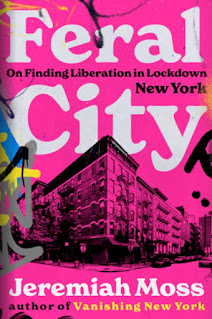Evidence for that is found in the wonderful short film Twilight Becomes Night by Virginie-Alvine Perrette. In it, the filmmaker profiles several small New York businesses that suffer in the city's over-success. There is much in the film to cry about and, at the end, I had tears in my eyes, but there is also something to celebrate: Independent Suba Pharmacy faced eviction twice, and twice its customers fought--and won--using petitions, boycotts, rallies, even phone calls to the bank that planned to move in, saying, "We will not use your services." The bank backed off. Suba still stands.

From 1990 - 2003, New York City lost 447 neighborhood pharmacies, a 28% decrease. In the same time period, the city gained 434 chain pharmacies—a 263% increase.
I interviewed Virginie over email and here's what she had to say:
What inspired you to make this film?
I was born in New York City, grew up here, and have a deep love for this city. After about ten years away for college and work, I came back--looking for the place I had left behind. It was instantly apparent to me that the city was changing in a way that was different from any other change I’d seen or read about before.

The Basket Shop closed in 2001 after 38 years. It is now in Brooklyn.
New York is vanishing every day, more and more. If you were to begin making this film today, what would you include?
I would like to have documented the transformation occurring on 9th Avenue between 42nd and 57th Streets. That strip was a little world unto itself of small stores and restaurants. It survived much longer than many other areas of New York today. And yet it has been devastating to watch block after block of that area be gutted and rebuilt with chains and banks. It is a microcosm of what is happening throughout the city, and yet its smaller scale makes it all the more noticeable.
People like to say, "NYC is always changing and always will." But I believe what's happening now is different. Why, in your opinion, is NY vanishing?
New York is defined by change and thrives on change. But this is different. It goes to the core of what makes the city unique, and gives the city its soul. As Isaac Fergusson, a NYC cab driver, says in the documentary: “New York has always been the engine of small business.” New York’s energy and character come, in part, from that belief that you can come here and start something small and grow it. Yet now it is harder and harder to start a small business here, let alone succeed. And without small shops of all sorts, New York City becomes some monolithic behemoth that is without community, diversity, humanity, or distinctive character. And we, as New Yorkers, lose our connections to one another.

Michael’s Barbershop closed in 2002 after 92 years. They did not reopen.
How do you think 9/11 hastened the vanishing?
I think the widespread closing of independent businesses started before 9/11. I think that as the city was “cleaned up" it also created a regulatory atmosphere that welcomed big business and made it administratively more difficult for small business to survive. It is my sense, from interviews with store owners, that 9/11 was all too often the final obstacle they could not overcome. It pushed them over the edge and forced them to close – yet they were already in a precarious position to begin with.

Manny and Eric Schwarz’s M&E Hardware closed in 2005 after 50 years. They did not reopen. Manny passed away soon after.
If you were Queen of New York, with unlimited power, what would you do to save our city?
I would offer rent subsidies to any store in need that could collect 100 names of support as being a store of value to a community. I would ban big box stores. I know they are convenient, but they decimate our communities. And over the long run they are not necessarily cheaper. I would penalize landlords who evict small businesses that have been around for years and then keep their stores vacant in hopes of getting higher rents. I would have an official “Kids Bring Your Parents to Your Favorite Neighborhood Store Day.” My feeling is that kids know the value of the neighborhood store – they feel safe there. And, lastly, I would create union-like organizations to represent and lobby on behalf of independent shops.
What can we do to save our city?
There are so many ways to affect change. You can simply make it a priority to choose your local store over a chain store, you can talk to your neighborhood store owners and find out what they are facing, you can organize a neighborhood committee to help store owners, you can write letters to your government representatives. For this reason, I am organizing screenings of Twilight Becomes Night followed by panel discussions that can offer specific ways to take action. There are many groups (listed on my website) that help cities and residents learn how to protect local business.



No comments:
Post a Comment